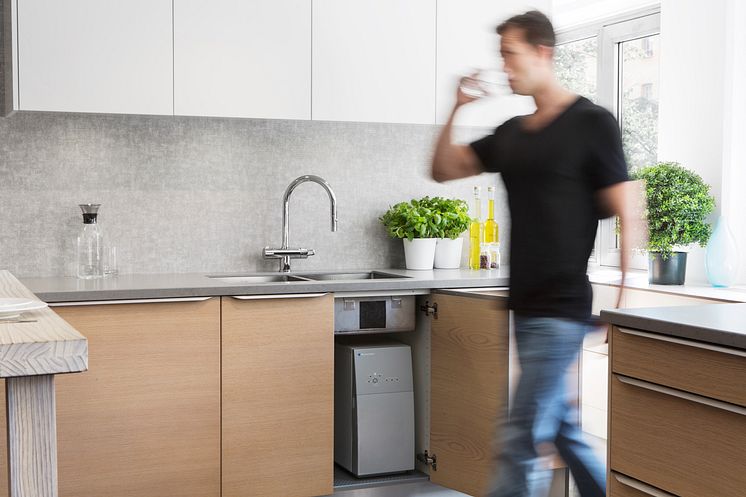
Isolating at home? Don't forget to stay hydrated...
"The impact of coronavirus has brought a new focus on how many of us live our lives," writes Dr. Angie Mueller (photo below) for Bluewater "Besides social distancing, hand washing and not touching your face - staying hydrated is one of the most important actions you can take to help prevent or recover from COVID-19. So, in these strange times during a quarantine, one of the main ways you can help yourself stay healthier is by staying hydrated.
Your level of hydration is critically important to the efficiency of your immune system. Keeping your body hydrated can help prevent sickness, and if you are sick, it will help you recover. A dry nose and throat is an easy way for a virus to enter your body, and it will wreak havock once inside if you are dehydrated.
Why hydration is VERY important when you’re sick
Unfortunately, dehydration is a major wellness issue that people suffering from illnesses such as Coronavirus can find easy to ignore, especially when running a fever. So why is hydration so important when fighting an illness?
Sickness-fighting proteins, also known as lymph, are transported throughout your body via bodily fluids. Dehydration will slow or stop the transport of these proteins as they attempt to move through the body and fight sickness. In contrast, loading up on fluids will help to reduce headaches, relieve flu-like symptoms, and strengthen the body’s immune response system, ultimately diminishing the sickness all together.
- Hydrating properly allows you to:
- Improve circulation and oxygen delivery to your tissues by flushing out harmful toxins
- Help your digestive system run more efficiently, preventing vomiting, constipation and diarrhea
- Keep your eyes, mouth and nasal tissues wet, blocking contaminants that can cause infection
Hydration helps prevents Illness
Up to 75% of Americans suffer from chronic dehydration, ultimately increasing the chance of illness. Living a busy lifestyle, it can be easy to neglect the little things that are necessary to remain healthy. Daily routines, both positive and negative, have a compound effect on a person’s well-being. Instead of waiting to hydrate once already sick, people who care about their health should develop a daily habit of proactively drinking plenty of fluids. This will help to strengthen the immune system, optimize the body’s natural operations and prevent illness.
How much water should I drink to stay hydrated?
Since everybody is different, everyone has different hydration requirements. The old “6-8 glasses” per day rule is outdated and just doesn’t cut it. Dr. Angie recommends a simple calculation based on your body weight:
- Measure your weight in pounds
- Divide that number in half
- That is how much water your body needs in ounces
Example (with kilo equivalent):
- You weigh 150 pounds (almost 70 kilos)
- 150 / 2 = 75
- You need to drink 75 ounces (or approx. 2.3 liters) of water per day
Other considerations:
This calculation is the baseline you need on a non-active day assuming you are healthy. If any of the points listed below apply to you, you need to add 10-20 ounces to this number.
- If you have pain or deal with inflammation
- If you are sick, or fighting off an illness
- If you consume dehydrating foods or beverages such as a high amount of salt, caffeine, or alcohol
- If you are pregnant or breast feeding
- If you live in a tropical climate or sweat a lot
Make a Hydration Plan and Stick to It
The key to having a healthy and strong immune system is developing a hydration plan and committing to it. The good news is that maintaining a healthy hydration plan is actually very simple to do. All it takes to maintain consistency with your hydration is to create a schedule and stick to it.
Tips for creating a personalized hydration plan for yourself:
- Have a goal to reach by the end of the day. Always know how much you need to drink in a day by following the simple calculation above.
- Choose your favorite water bottle and measure how many ounces it holds, Drink out of the same water bottle all day, until you reach your recommended ounces
- Base your hydration schedule off your daily events, such as meals.
- Drink half of your water intake between breakfast and lunch, drink the other half of your water intake between lunch and dinner.
- Finish your daily water intake before dinner.
- If you are forgetful, set reminders every 30 min- 1 hour on your phone, indicating how much water to drink before the next alarm.
When self-isolating
If you are self-isolating at home due to Covid-19, create a hydration routine that works best for you. By remaining conscious of your hydration and making this routine a priority in your daily life, you will begin to realize the many daily health benefits of hydration and better protect yourself from illness."